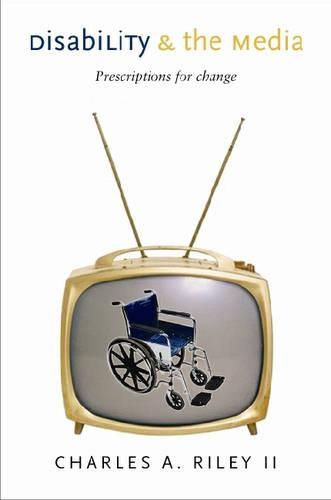Readings Newsletter
Become a Readings Member to make your shopping experience even easier.
Sign in or sign up for free!
You’re not far away from qualifying for FREE standard shipping within Australia
You’ve qualified for FREE standard shipping within Australia
The cart is loading…






In the past decade, the mass media discovered disability. Spurred by the box-office appeal of superstars such as the late Christopher Reeve, Michael J. Fox, Stephen Hawking, and others, and given momentum by the success of Oscarwinning movies, popular television shows, best-selling books, and profitable websites, major media corporations have reversed their earlier course of hiding disability, bringing it instead to center stage. Yet depictions of disability have remained largely unchanged since the 1920s. Focusing almost exclusively on the medical aspect of injury or illness, the disability profile in fact and fiction leads inevitably to an inspiring moment of overcoming. According to Riley, this cliche plays well with a general audience, but such narratives, driven by prejudice and pity, highlight the importance of fixing the disability and rendering the sufferer as normal as possible. These stories are deeply offensive to persons with disabilities. Equally important, misguided coverage has adverse effects on crucial aspects of public policy, such as employment, social services, and health care. Powerful and influential, the media is complicit in this distortion of disability issues that has proven to be a factor in the economic and social repression of one in five Americans. Newspapers and magazines continue to consign disability stories to the back of the book health or human-interest sections, using offensive language that has long been proscribed by activists. Filmmakers compound the problem by featuring angry misfits or poignant heroes of melodramas that pair love and redemption. Publishers churn out self-help titles and memoirs that milk the disability theme for pathos. As Riley points out, all branches of the media are guilty of the same crude distillation of the story to serve their own, usually fiscal, ends. Riley’s lively inside investigation illuminates the extent of the problem while pinpointing how writers, editors, directors, producers, filmmakers, advertisers and the executives who give their marching orders go wrong, or occasionally get it right. Through a close analysis of the technical means of representation, in conjunction with the commentary of leading voices in the disability community, Riley guides future coverage to a more fair and accurate way of putting the disability story on screen or paper. He argues that with the discovery by Madison Avenue that the disabled community is a major consumer niche, the economic rationale for more sophisticated coverage is at hand. It is time, says Riley, to cut through the accumulated stereotypes and find an adequate vocabulary that will finally represent the disability community in all its vibrant and fascinating diversity.
$9.00 standard shipping within Australia
FREE standard shipping within Australia for orders over $100.00
Express & International shipping calculated at checkout
In the past decade, the mass media discovered disability. Spurred by the box-office appeal of superstars such as the late Christopher Reeve, Michael J. Fox, Stephen Hawking, and others, and given momentum by the success of Oscarwinning movies, popular television shows, best-selling books, and profitable websites, major media corporations have reversed their earlier course of hiding disability, bringing it instead to center stage. Yet depictions of disability have remained largely unchanged since the 1920s. Focusing almost exclusively on the medical aspect of injury or illness, the disability profile in fact and fiction leads inevitably to an inspiring moment of overcoming. According to Riley, this cliche plays well with a general audience, but such narratives, driven by prejudice and pity, highlight the importance of fixing the disability and rendering the sufferer as normal as possible. These stories are deeply offensive to persons with disabilities. Equally important, misguided coverage has adverse effects on crucial aspects of public policy, such as employment, social services, and health care. Powerful and influential, the media is complicit in this distortion of disability issues that has proven to be a factor in the economic and social repression of one in five Americans. Newspapers and magazines continue to consign disability stories to the back of the book health or human-interest sections, using offensive language that has long been proscribed by activists. Filmmakers compound the problem by featuring angry misfits or poignant heroes of melodramas that pair love and redemption. Publishers churn out self-help titles and memoirs that milk the disability theme for pathos. As Riley points out, all branches of the media are guilty of the same crude distillation of the story to serve their own, usually fiscal, ends. Riley’s lively inside investigation illuminates the extent of the problem while pinpointing how writers, editors, directors, producers, filmmakers, advertisers and the executives who give their marching orders go wrong, or occasionally get it right. Through a close analysis of the technical means of representation, in conjunction with the commentary of leading voices in the disability community, Riley guides future coverage to a more fair and accurate way of putting the disability story on screen or paper. He argues that with the discovery by Madison Avenue that the disabled community is a major consumer niche, the economic rationale for more sophisticated coverage is at hand. It is time, says Riley, to cut through the accumulated stereotypes and find an adequate vocabulary that will finally represent the disability community in all its vibrant and fascinating diversity.